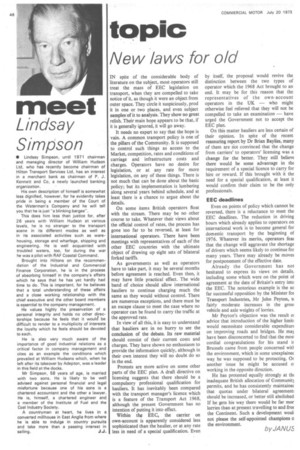topic
Page 48

If you've noticed an error in this article please click here to report it so we can fix it.
New laws for old
IN spite of the considerable body of literature on the subject, most operators still treat the mass of EEC legislation on transport, when they are compelled to take notice of it, as though it were an object from outer space. They circle it suspiciously, prod it in one or two places, and even subject samples of it to analysis. They show no great relish. Their main hope appears to be that, if it is generally ignored, it will go away.
It needs no expert to say that the hope is vain. A common transport policy is one of the pillars of the Community. It is supposed to control such things as access to the Market, competition, rates and conditions of carriage and infrastructure costs and charges. Operators have no desire for legislation, or at any rate for more legislation, on any of these things. There is not much that can be done about the basic policy; but its implementation is lumbering along several years behind schedule, and at least there is a chance to argue about the details.
On some items British operators float with the stream. There may be no other course to take. Whatever their views about the official control of rates, the process has gone too far to be reversed, at least for international operators. There have been meetings with representatives of each of the other EEC countries with the ultimate object of drawing up eight sets of bilateral forked tariffs.
As governments as well as operators have to take part, it may be several months before agreement is reached. Even then, it may have little practical effect. The wide band of choice should allow international hauliers to continue charging much the same as they would without control. There are numerous exceptions, and there must be an escape clause to meet the case where no operator can be found to carry the traffic at the approved rate.
In view of all this, it is easy to understand that hauliers are in no hurry to see the conclusion of the debate. Its raw material should consist of their current costs and charges. They have shown no enthusiasm to provide the information quickly, although in their own interest they will no doubt do so in the end.
Protests are more active on some other parts of the EEC plan. A draft directive on licensing suggests that there should be a compulsory professional qualification for hauliers. It has inevitably been compared with the transport manager's licence which is a feature of the Transport Act 1968, although the present Government has no intention of putting it into effect.
Within the EEC, the carrier on own-account is apparently considered less sophisticated than the haulier, or at any rate less in need of a special qualification. Even by itself, the proposal would revive the distinction between the two types of operator which the 1968 Act brought to an end. It may be for this reason that the representatives of the own-account operators in the UK — who might otherwise feel relieved that they will not be compelled to take an examination — have urged the Government not to accept the EEC plan.
On this matter hauliers are less certain of their opinion. In spite of the recent reassuring report by Dr Brian Bayliss, many of them are not convinced that the change from carriers' to operators' licensing was a change for the better. They still believe there would be some advantage in the requirement of a special licence to carry for hire or reward. If this brought with it the need for a special qualification, at least it would confirm their claim to be the only professionals.
EEC deadlines
Even on points of policy which cannot be reversed, there is a reluctance to meet the EEC deadlines. The reduction in driving hours which already applies to operators on international work is to become general for domestic transport by the beginning of 1976. Whatever its merits, operators feat that the change will aggravate the shortage of drivers which seems likely to continue for many years. There may already be moves for postponement of the effective date.
Already the Government has not hesitated to express its views on details, including some which were on the point of agreement at the date of Britain's entry into the EEC. The notorious example is the so far successful opposition by the Minister fon Transport Industries, Mr John Peyton, u fairly moderate increases in the gros! vehicle and axle weights of lorries.
Mr Peyton's objection was the result a advice that introduction of the higher limit; would necessitate considerable expenditurt on improving roads and bridges. He ma) have been disconcerted to find that the mos cordial congratulations for his stand it Brussels came from people concerned witi the environment, which in some unexplainee way he was supposed to be protecting. 01 another issue he might be accused o working in the opposite direction.
He has protested equally strongly at tht inadequate British allocation of Comm unit permits, and he has consistently maintainee that quotas under bilateral agreement: should be increased, or better still abolished If he gets his way there would be far mor lorries than at present travelling to and froz the Continent. Such a development woul not please the self-appointed champions the environment. by JANUS




































































































